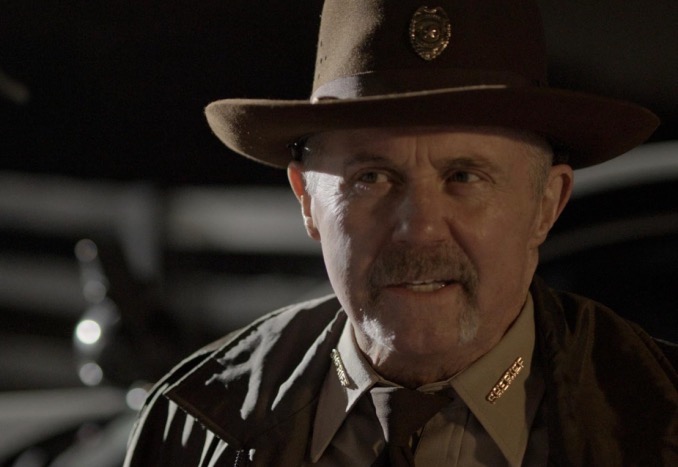Products You May Like

I just finished Hayride to Hell and I can’t believe how much I liked it. I was expecting to be let down and I wasn’t. Some films boasting familiar faces from the genre space pull the viewer in with recognizable names (who are usually the best part of the film). But those actors are often relegated to tertiary roles, leaving us wishing the picture had more of the cast member we showed up to see. Hayride to Hell is not one of those films. Bill Moseley features prominently and Kane Hodder gets quite a bit of screen time, too. It’s great fun to see the stars play off of one another and turn in campy performances that keep the tone light and comical. The Motel Hell homages are a real delight. Better yet, the film is different enough from this source of obvious inspiration to stand as its own entity.
What is Hayride to Hell about?
The picture follows Farmer Sam (Moseley), the proprietor of a haunted hayride. The county commissioners want to buy off a portion of his land to develop. Farmer Sam wants absolutely none of that. So, he extends an invitation to the mucky-mucks to take the ride and evaluate the experience for themselves. Sam tells them if they don’t find their tour sufficiently scary, he’ll pack up and leave town. What will Sam do to wow the commissioners? You’ll just have to watch and find out. And you really should. This is a fun, seasonal indie effort with a strong talent pedigree.
Before I get into what I liked, however, I’m going to speak regarding a few aspects I didn’t care for. I actually thought I wasn’t going to dig this film for the first 20 minutes because I didn’t know quite what to make of it. And then it sunk in that this was meant to be an over-the-top romp filled with campy tomfoolery. But that’s not as obvious as it should be from the jump. I wish the film had done more to sell the camp factor at the onset.
My other primary criticism is that some of the supporting players are a little stiff. Once the action really gets going, that becomes less noticeable. However, the inexperience of some of the supporting cast members becomes distracting at times.
There are a few other issues I had. But most of them relate to the film’s status as a lower-budget indie picture and it’s not fair to hold a feature of this ilk to the same standard as a glossy studio pic with limitless resources.

What does the film get right?
As for what works, there are quite a few aspects of Hayride to Hell that charmed me. Bill Moseley is so endearing as Farmer Sam, an obvious homage to Farmer Vincent from Motel Hell. He’s engaging enough to give his fans a good reason to keep watching. Moseley is spitting out most of his dialogue with exaggerated mannerisms and chewing up the scenery. He brings an undeniable charm to his character. He knows the assignment and delivers just the right amount of schlock to make the onscreen mayhem he perpetrates fun.
Director Dan Lantz does plenty to play into the film’s exaggerated tone. He knows he’s making schlock cinema and he runs toward that conceit, rather than trying to play it straight. That strategy is effective because it gives the film a certain appeal to camp enthusiasts and gives us a reason to look past some of the shortcomings associated with low-budget filmmaking.
The camp factor leads to some great comedic takedowns of redneck culture. In one ghastly ordeal, a character stabs a bug with her knitting needle and then eats the bug. There’s a great callback to that sequence near that denouement that makes the earlier scene seem tame by comparison. It’s as grotesque as it is comical.
The balance skews more toward comedy than horror but it works
The film leans way heavier into comedy than horror. However, there’s an effective sequence in a cemetery that creeps up by crafting a false sense of security. There are a couple of other great jump scares that sneak up and catch you off guard, as well. Jump scares get a bad rap. But legendary filmmakers like Hitchcock have utilized them (Psycho, for instance) and they serve an important purpose. Jump scares ratchet up viewer anxiety and leave the audience more susceptible to future cinematic sorcery. If these tropes aren’t used solely to distract from something that’s missing, I have a hard time understanding the pushback. At any rate, there are a few great scenes that make smart use of the technique.
The sliding screen transitions are also a nice touch. They reminded me of transitioning between panes in a comic book. And that’s a neat distinction because this film has an exaggerated sensibility that reminded me just a little bit of EC Comics. I think it’s the morality play where horrible people get their just desserts.
If I’ve convinced you that Hayride to Hell sounds like your cup of tea, you can find it on VOD now from Breaking Glass Pictures.
Summary
A charming exercise in schlock.
Categorized:Reviews

